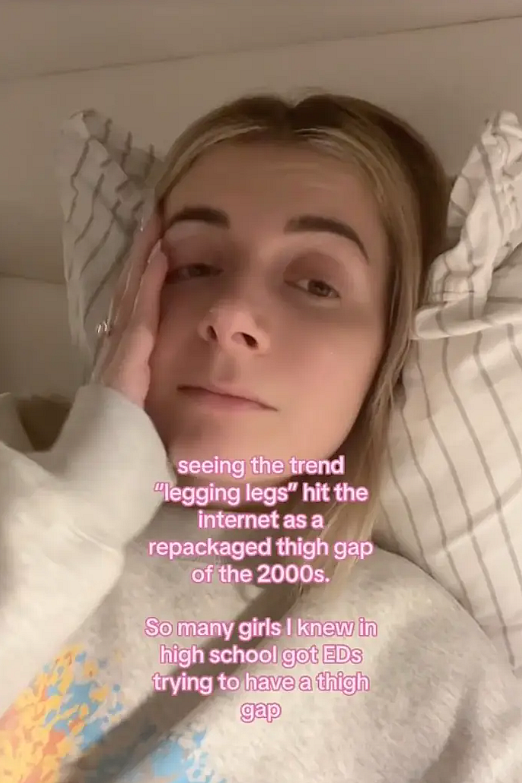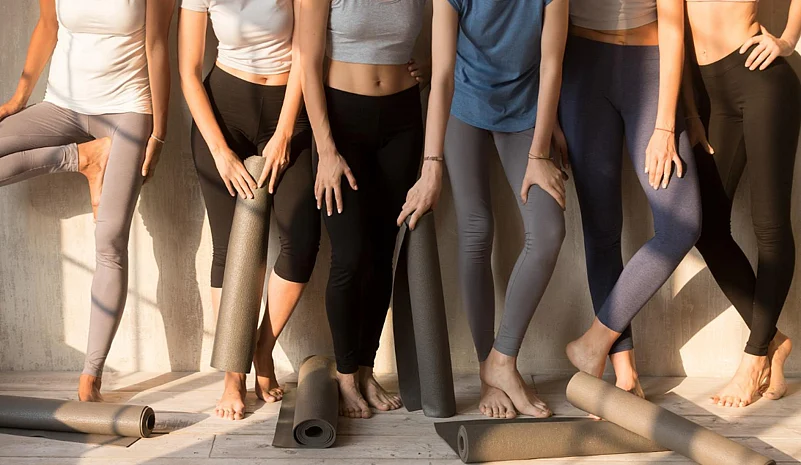The latest body-focused term making waves on social media is "legging legs," and there are concerns about its impact. This phrase, which is currently banned from search on TikTok, has gained popularity as a way to describe the perceived "perfect" or "ideal" leg size and shape for wearing leggings. However, experts argue that it can promote an unhealthy body image.
In simple words, this trend involved young girls admitting that they didn't feel their legs looked "good" in athletic leggings, leading to concerns about unrealistic body standards.
This trend gained popularity towards the end of the previous year and reinforces the harmful notion that there is only one ideal body type and appearance, which can mislead and potentially negatively impact impressionable and vulnerable young individuals.
It seems like a contemporary variation of the internet-driven trend known as the "thigh gap" that gained momentum around 2013. During that period, many young women and teenagers were pursuing the challenging and potentially harmful goal of achieving a slender physique where their thighs wouldn't touch when they stood with their feet together.
Elizabet Altunkara, the Director of Education at the National Eating Disorders Association, emphasizes that social media trends focusing on body shape and appearance can have adverse effects. These trends not only negatively impact individuals already dealing with eating disorders but also pose risks to others.
What are "legging legs"?
The term "legging legs" has gained popularity on TiktTok as a way to describe the perceived "perfect" or "ideal" leg size and shape for wearing leggings.
"The new trend 'legging legs' is problematic as it suggests that only certain body types are able to wear a piece of clothing — an idea that promotes the appearance ideal we have all been exposed to and whose internalization may put people at risk to develop an eating disorder," Altunkara says.
According to Dr. Samantha DeCaro, who serves as the Director of Clinical Outreach and Education at The Renfrew Center, a network of facilities specializing in eating disorder treatment, the trend can be described as "yet another inappropriate way to body shame individuals."
"These types of trends are destructive," she says. "Body dissatisfaction is a major risk factor in the development and maintenance of an eating disorder."
While some of the videos related to "legging legs" on social media did showcase slender legs and thigh gaps, the trend lacks a precise definition for what qualifies as "legging legs," seemingly leaving this label open to subjective interpretation. Nonetheless, it broadly perpetuates a similar notion of specific body ideals, akin to the earlier "thigh gap" trend.

Numerous international publications have reported that the social media platform has recently prohibited the use of the hashtag. As a result, users attempting to search for videos related to this trend are now presented with information regarding disordered eating instead.
A spokesperson from TikTok Australia confirmed to news.com.au that “when people search for #legginglegs or content related to eating disorders, they are shown a pop-up with a link to the Butterfly Foundation”.
“TikTok is an inclusive and body-positive environment and we do not allow content that depicts, promotes, normalizes or glorifies eating disorders.”
Outrage Over The 'Leggings Legs' Trend
Older women, who recognize "legging legs" as a resurgence of toxic body image standards from their own past, have criticized the trend, with therapist Holly Essler describing it as “repulsing.”
“Basically it’s a trend saying that if you have leggings and you wear leggings, your legs have to look a certain way in them,” she said in a video.
“Again, this is disgusting. Do not let social media tell your body that it is a trend. If you have a body and you have leggings, you have legging legs.”
"While we applaud TikTok for removing the hashtag and replacing it with links to eating disorder resources, space needs to be given for continued conversations and education on the fact that self-worth is not determined by ones' bodies," DeCaro says.
Another TikTok user, @emilyxpearl, raised concerns in a video, questioning whether “we understand what we are doing to the younger generation of women”.

“Do we understand that there are 15-year-old girls that wear leggings every single day that now feel that they cannot wear leggings because they don’t have legging legs … the most stupid thing I’ve ever heard in my life,” she said.
“Do you understand that because of your video telling some little girl that she doesn’t have legging legs, she now feels that she can’t fit into society?”
Australia's Steph Claire Smith strongly criticized the movement as “disappointing” and “toxic.”
“I remember being obsessed with having a thigh gap. I remember it driving me insane, being angry at my genetics, basically, and losing anything that I had on my legs just to have a friggin’ gap because social media told me that that was what was attractive,” the model and fitness entrepreneur said.
“And now there is a trend: legging legs. If you have legs, and you’ve got a pair of leggings on, you’ve got legging legs."
“Don’t worry what the internet is freaking saying. I am so, so done, so done, with these stupid trends that are so, so toxic and so damaging.”
The bottom line is that people, regardless of their body shape and size, should feel free to wear clothing of their choice without facing judgment.
"Leggings are for everyone, not solely for a specific body type," Altunkara says.
Social Media And Eating Disorders
A recent survey conducted by the Australian eating disorder support and treatment service, the Butterfly Foundation, revealed that nearly half of individuals aged 12 to 18 experience dissatisfaction with their bodies due to the influence of social media.
Numerous studies in recent years have also identified a disturbing connection between the use of Instagram and TikTok and feelings of body dissatisfaction and the development of eating disorders.
Melissa Wilton, Head of Communication and Engagement at the Butterfly Foundation, said it’s “vital that we combat this rhetoric and encourage people to see themselves as a whole being, rather than just their appearance and body size”.
“These appearance-based trends on social media can be extremely dangerous as they portray a very narrow ideal of beauty and suggest that the perfect body exists, while also enforcing the belief that your appearance or body is what makes you worthy,” Ms Wilton told news.com.au.
“Research shows that the more a person internalises these unrealistic body and appearance ideals, the more likely they are to experience body dissatisfaction which can lead to the development of disordered eating and eating disorders.”
She also highlighted the significance of developing social media literacy, stating that it is crucial to making platforms like TikTok and Instagram “a positive space for users, reducing the risk of developing or exacerbating an eating disorder or body image issue and improving resilience and wellbeing”.
“The power is in your hands – you can block or report distressing content and accounts, take regular breaks from scrolling … and fill feeds with positivity by following accounts that align with your own passions, hobbies, or interests outside of the realm of body appearance.
“If it is your friends that are posting this harmful content, and you don’t want to hurt their feelings by unfollowing them, use the ‘mute’ feature so you don’t see their content – they won’t be notified.”
For those grappling with body image or eating-related concerns, the National Eating Disorders Association's resource center offers valuable information and resources to navigate every stage of this journey.



























